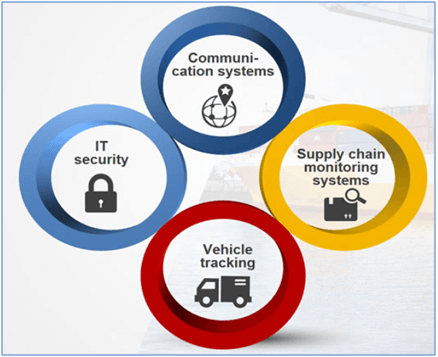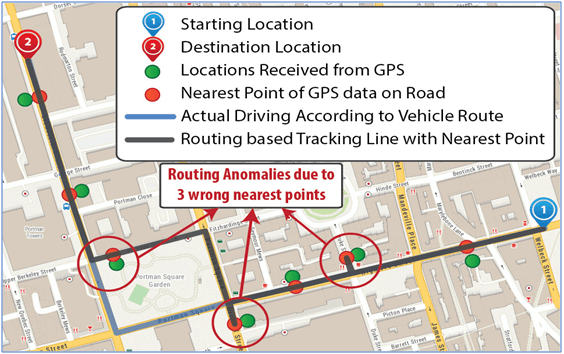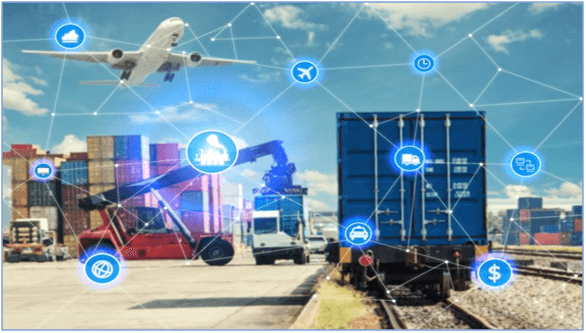The time when it was enough to just move goods from point A to point B, passed a long time ago. Because of high competition and multiple challenges, the focus is made on customers, meeting their needs and expectations. Now the top-priority objectives of logistics companies are to ensure just-in-time delivery, supply chain visibility, product lifecycle transparency and quality services. The success of any logistics company lies in efficient inventory management and warehousing, automation of internal business processes, fast delivery and taking care of safe storage and quality of goods. The accomplishment of 7Rs principles that include moving the right product – in the right quantity and condition, at the right time and at the right price – to the right place and the right customer.
Table of Contents
Internet of Things (IOT)
Bringing with its smart connections and use cases, the Internet of Things (IoT) is about to revolutionize the logistics domain. Offering many advantages and opportunities, IoT-based solutions are becoming widely introduced in the sector. Supply chain monitoring, vehicle tracking, inventory management, safe transportation and automation of processes are the key to IoT applications and the principal components of connected logistics systems, as shown in the diagram below.

IoT in Transportation makes use of IoT devices like scanners, controllers, beacons, RFID systems, along with a strong IoT platform that interconnects these devices to apps and websites that make up the company’s digital ecosystem. Such end-to-end functionality can ensure that businesses use the advantages of Big Data, cloud, mobile, and IoT for increasing their business intelligence and improving the efficiency of their operations on a global platform.
Location management systems
In the logistics domain, IoT can create a smart location management system that will enable companies to easily track driver activities, vehicle location, and delivery status. Once goods are delivered or come to a certain place, a manager is notified by a push message. Such a solution is an irreplaceable assistant in delivery planning and compilation and viewing of schedules. All changes are instantly detected and reflected in real time. So, IoT technology can be successfully used for improving location management and streamlining business processes.

Inventory Tracking and Warehousing
Inventory management and warehousing are one of the most important parts of the connected logistics ecosystem. The placement of small inexpensive sensors will allow companies to easily track inventory items, monitor their status and position and create a smart warehouse system. With the help of IoT technology employees will be able to successfully prevent any losses, ensure safe storage of goods, as well as efficiently locating an item needed. By now, almost all logistics companies have already adopted such IoT solutions in their work. The minimization of human errors also becomes possible due to IoT.
IoT Technology and Predictive Analytics
Predictive analytics is taking centre stage in different industries, helping companies and corporations create effective business development strategies, improve the decision-making process, make smart business insights, manage risks and a lot more. Internet-enabled devices are here to collect large data amounts and transmit them to the central system for further analysis. IoT and predictive analytics solutions can be applied for route and delivery planning and identification of various defects before something goes wrong. The results are a timely replacement of machinery parts, prevention of any crashes and efficient vehicle/equipment maintenance.

IoT and Blockchain for Supply Chain Management
Supply chain management carries various challenges, from illegal food practices to taking care of product conditions. That’s why both companies and their customers want the option to trace the product lifecycle – from the origin of goods to their transportation to the customer’s hands. While blockchain can solve many IoT security issues, it can add great value to supply chains too. Walking hand in hand, they can fulfil the need for supply chain security, transparency and traceability. The placement of radio-frequency identification tags and sensors will allow monitoring of things such as product temperature and humidity, vehicle location and stages of the transportation process. The data is recorded and saved in the blockchain, every product is given a digital ID that secures all information about it along with the product lifecycle.
Self-Driving Vehicles
Soon, we will become the witnesses of the widespread use and adoption of self-driving vehicles, being tested now. Logistics companies will be the first to take an advantage of their integration into business processes. While IoT devices are responsible for collecting large data amounts, the analytics system turns them into smart driving routes and directions. This way, businesses can also minimize car accidents, reduce operating costs and optimize road traffic.

Drone-Based Delivery
Drones, having the highest potential in retail, logistics, agriculture and e-commerce, drones and droids can add speed and efficiency to the working environment.
In the logistics industry, drones can ensure business process automation by providing smart inventory tracking, fast transportation of goods, and instant in-store delivery. What’s more, they enable to solve last-mile delivery problems. The market is quickly developing, according to Gartner forecasts, it is expected to reach $11.2bn by 2020.
Conclusion
The application of data in logistics industry does not have to be complex. Instead, data can be applied to current, ongoing procedures and processes to improve your efficiency and accuracy in your shipping tactics. Furthermore, data provides real-time insight into how to change and address current concerns and problems before they evolve into serious issues for your company. Ultimately, you must accept data’s benefits as well as its flaws when uncleaned. Think of data in logistics for improving transportation as your personal assistant in making business decisions. Data can help you improve your transportation processes when applied correctly.
Being under technological progress and facing a lot of challenges, today’s logistics industry sees a rapid transformation and growth. Coming up with inventory tracking and location management solutions, driverless transportation systems, and intelligent communications, IoT will revolutionize the logistics domain.
References
Abdul Kareem Mohamed Yasin. (2018). “AI Technologies Enhancing Supply Chain Management” Retrieved from SIPMM: https://publication.sipmm.edu.sg/ai-technologies-enhancing-supply-chain-management/ , accessed 12/09/2018.
Ali Alghobari. (2017). “Logistics Management; Concepts, functions and Goals (Brief Research)”. Retrieved from https://www.ctc.com/public/solutions/techandinnovation/integrated-logistics.aspx, accessed 12/09/2018.
Concurrent Technologies Corporation. (2018). “Integrated Logistics Support and Supply Chain Management”. Retrieved from https://www.ctc.com/public/solutions/techandinnovation/integrated-logistics.aspx, accessed 12/09/2018.
Sivalingam Munisamy. (2018). “The Eight P’s for Effective Delivery of an Integrated Logistics Operations”. Retrieved from SIPMM: https://publication.sipmm.edu.sg/8-p-effective-delivery-integrated-logistics-operations/ , accessed 12/09/2018.
Witron Integrated Logistics.(2018). “Smart Logistics (4.0): End-to-end optimization on the basis of maximum data transparency”. Retrieved from https://2018.modexshow.com/press/release.aspx?id=5289, accessed 12/09/2018.

